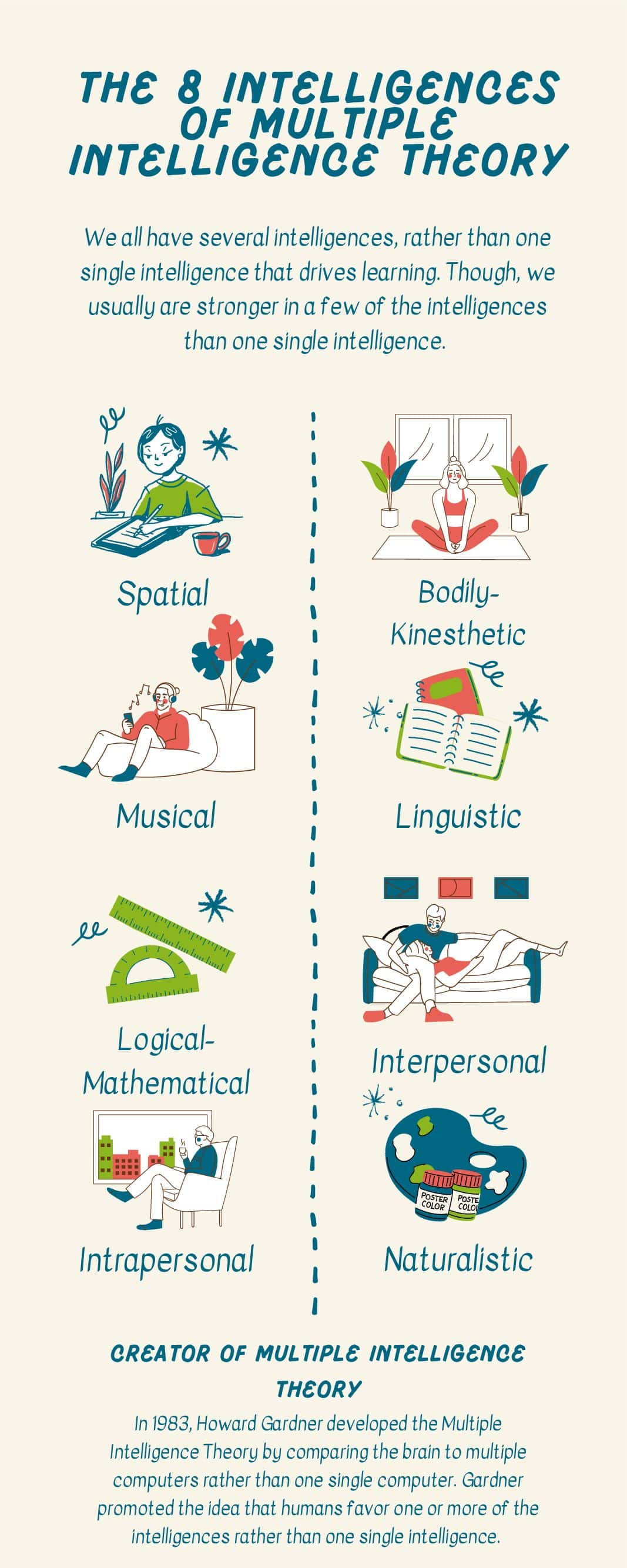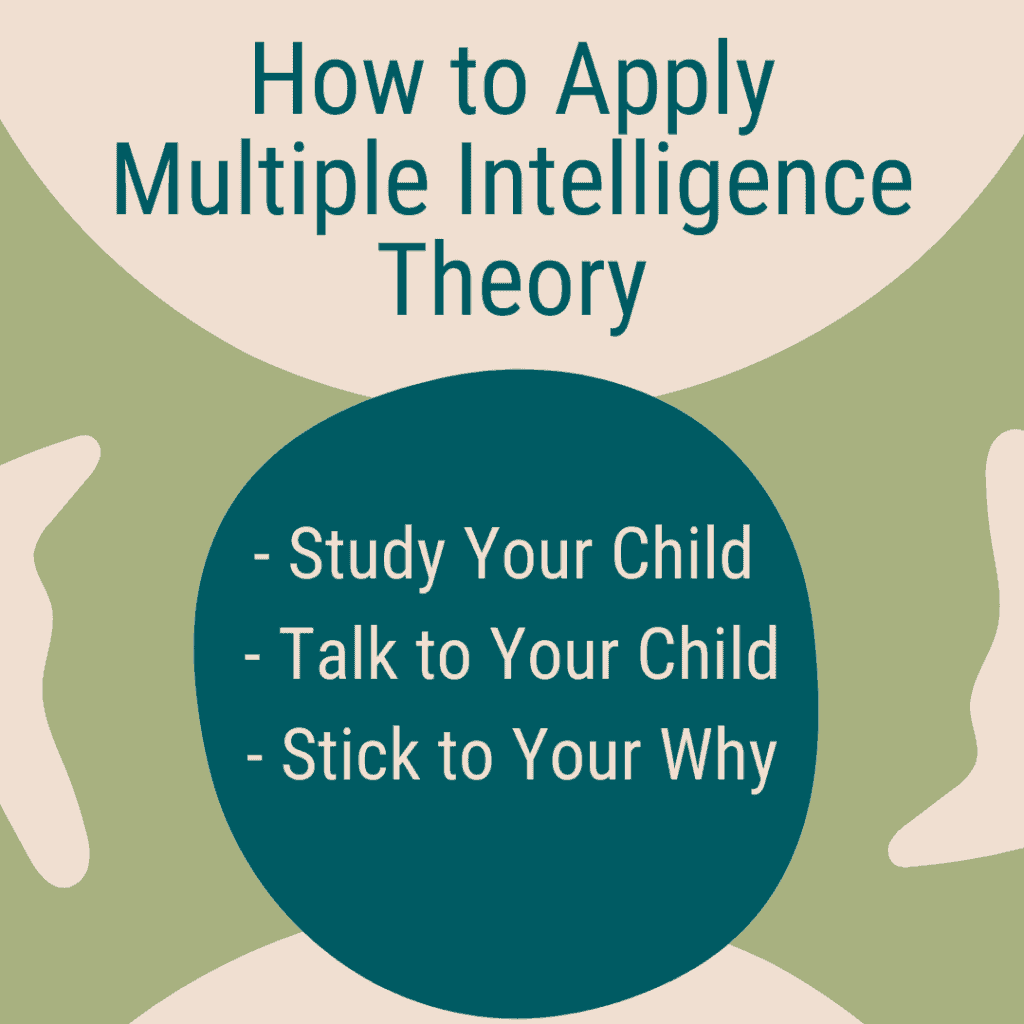
Motivate Your Kids to Read Today
In today’s culture, reading is one way to help your kids attain more academically. Here are some ideas to create a culture of reading in your home.

What is Multiple Intelligence Theory? Explore how our different learning styles affect learning and your child’s development inside and outside of school.
Estimated reading time: 10 minutes
Multiple Intelligence Theory might seem like a stuffy, academic term. But it plays a role in everyday interactions with our families, especially our kids. For example, as I was taking my three and five-year old to preschool one day, I overheard a conversation they were having.
“Hey Micah, what’s your favorite thing about school?” Titus asked.
Micah knew his answer right away, “I like the big playground! What about you?”
“Learning is my favorite part. It’s very important that we learn,” was Titus’ answer.
I continued to digest that conversation long after I dropped them off, especially since I had been researching multiple intelligences and analyzing each of my kids’, my husband’s, as well as my own behaviors.
Some of my observations included:
Now, let’s talk about you.
Maybe you never really questioned why you did so poorly in math. You just knew math wasn’t your thing. And now you know you’re not the one for the job to help your 5th grader with math homework. Or, maybe you’ve journaled your entire life but never really considered why you love journaling so much. Maybe you’re known as a fantastic baker, but in your heart, you know that the cake will only be perfect if you strictly follow the recipe.
All these experiences are related to you as a learner.
As you explore these multiple intelligences, it would be beneficial for you to consider your own self as a learner. How were you at school? How are you at work? What about chores around the house?
We truly are lifelong learners. So, primarily think of your child as you proceed, but do consider how you can benefit from learning a little more about you, your spouse, and even your co-worker as well.
I was first introduced to learning styles in college. Honestly though, all I remember is that all students learn differently. It wasn’t until I began my own research (maybe this is because of how I learn) that I really understood the importance of learning how we learn.
There are many leading researchers in this field that use various terminologies and theoretical approaches, but I will reference Howard Gardner’s (1983) multiple intelligences (MI) theory. Gardner (1983) suggested that the brain is comparable to multiple computers, rather than one single computer operating at capacity. Similarly, individuals have several intelligences, rather than one single intelligence that drives learning. With this observation and evidence from research in various fields, Gardner developed Multiple Intelligence Theory with eight different intelligences known in humans.

Gardner believes individuals are stronger in a few of the intelligences, not one single intelligence. Despite the natural tendency to lean towards one area, everyone should aim to diversify and develop in all the areas.
Spatial (or visual) intelligence includes individuals that learn through images, brainstorm by doodling, and create with space. They use and comprehend maps, make a vision come to life by drawing on napkins, and have a great sense of direction.
They’re the ones who build elaborate cars, complex homes, and draw the most beautiful geometrical shapes. Career examples for the spatial intelligent individuals include pilots, sailors, surveyors, and architects.
Kinesthetic intelligence includes individuals who use their bodies well. They are well-aware of their physical abilities, are hands-on learners, and can take things apart and put them back together with ease.
Athletes and performers—dancers, actors, and singers often have strong kinesthetic intelligence. Additional career choices include mechanics, carpenters, plumbers, and construction workers.
The friends that can play any instrument, sing amazingly, and compose the deepest melodies are musically intelligent.
These individuals have great rhythm, memorize content by turning words into lyrics, and may tap their pencils during class (most times driving others crazy, unless in the band hall). Career choices include singers, musicians, composers, and music teachers.
Individuals who are linguistically intelligent are those who express themselves very well with words. They journal, write poetry, and know the meanings of many words. They are great debaters, are often convincing others, and help individuals remember information with their verbal or written instructions.
As authors, they express very specific details and emotions with their choice of words and lead readers to feel and see what they are feeling and seeing themselves. Some career paths for these individuals include lawyers, authors, doctors, and educators.
Math teachers have a very difficult job. Typically, students either love or hate math. It’s rather hard to find people that are in between when it comes to the subject matter.
However, beyond loving or hating math, is the logical-mathematical intelligence. This intelligence suggests there are individuals that truly have a gift to comprehend and process complex equations, calculate numbers, and solve math problems with more ease than others.
People that quickly work out number problems in their head, come up with the tip amount without the help of the phone calculator, and find it challenging to have to write out their solving processes on the math test. Bankers, estimators, accountants, statisticians, and various number-driven career fields are great options.
Interpersonal intelligence is reflective of those that are aware of others’ needs. Whether in large group settings or one-on-one interactions, these individuals empathize, recognize, and understand the ambitions, desires, and emotional states of others.
They are the ones you want in your group, as they thrive and motivate others in such environments. They also help keep the peace, especially with the group members that have a harder time seeing others’ perspectives. These are the individuals to seek for managerial, HR, and pastoral positions. They are also wonderful entrepreneurs.
The intrapersonal intelligence isn’t reflective of an introverted person. It’s about inner awareness. These individuals understand his or her own thoughts and emotions deeply and like to problem solve from within.
They’d rather not be “forced” to solve things out loud, as they’re very in-tune with their feelings in their heads and hearts. Intrapersonal intelligent individuals are excellent sociologists, psychologists, and therapists.
Do you have a friend that can be on speed-dial when you need help with a house plant? That friend is naturalistically intelligent. These individuals are prone to be curious about nature, animals, and all sciences.
They recognize plants, trees, and flowers with ease. They have a fantastic green thumb and can truly hold a knowledgeable conversation about the weather. These individuals’ career paths lean towards the outdoors, helping animals, and agriculture.
Teachers are constantly doing their very best to modify various learning scenarios and accommodate to students’ individual needs. However, as Gardner continues to observe, traditional school settings are primarily geared towards two areas: linguistic and logical-mathematical intelligences.
One of the most impactful lessons I learned as a classroom teacher took place in 5th period, which was when the students had just come back from lunch. This particular class was always rowdy but also consisted of some brilliant teenage minds. After I finished teaching one day, the students began the independent process.
As I walked up and down rows, I noticed one boy, whom I will call Johnny, was standing over his desk. Quickly, I asked him to sit down. His response? “Mrs. Cagle, I really am working… it just helps to stand up while I’m writing.”
Shame on me for thinking that just because Johnny was standing, he wasn’t on task. For being so quick to jump to conclusions and wanting my classroom to look like the ideal classroom.
What does an ideal classroom look like anyway? One where students are all busy sitting quietly, looking like they’re engaged, or one where it may look chaotic, but where spaces are designed to truly engage students in their own learning? I hope teachers are willing to take a risk with the latter response.
Thankfully, I had enough sense to quickly respond, “Then you stand, bud. Thanks for letting me know.”
Knowing and voicing your child’s intelligences is never to require special treatment or manipulate the lesson plans the teacher carefully designed. It’s merely an empowerment for your child, as a learner, to communicate his or her needs, to establish healthy study habits that are appropriate for him or her, and to optimize experiences in school, church, and life.

Your child’s teacher will probably have a pretty good idea of your child’s learning tendencies sooner or later. But lots of learning will take place (or not) by the time the teacher has them figured out.
In some cases, it can be obvious—especially for kinesthetic learners. They’re wiggly, move around a ton, and can be fidgety.
In other instances, however, it’s difficult to narrow it down. The intrapersonal learners, for example, may strongly dislike working in groups. That can be a little harder to pinpoint because it can be clouded by introversion.
Therefore, avoid wasting time. The most important thing for your child is for learning to take place! So, if working in groups is distracting for him or her, this can be an easy accommodation for teachers to make with many assignments— give children choices.
For you to share your child’s needs with their teacher, you have to know them. Therefore, study them. Observe behaviors related to the eight intelligences. What are some of the most dominant ones you notice? Take notes.
Share what you’ve been noticing with your child. Ask for their input. Do they agree with your observations? Do they disagree? Why? Include them in the process. Teach them about what you’re studying. Tell them why.
If you don’t know the why, let me remind you: Learning how you learn will impact you forever! You’re doing the work for your child early in life so they can benefit from knowing their intelligences forever—in their continued educational pursuits, future careers, and even as they handle house chores (such as building a crib or dresser for their baby one day).
Knowing and voicing your child’s intelligences is never to require special treatment or manipulate the lesson plans the teacher so carefully designed.
It’s merely an empowerment for your child, as a learner, to communicate his or her needs, to establish healthy study habits that are appropriate for him or her, and to optimize their experiences in school, church, and life!
We’re all lifelong learners. The ultimate benefit of learning one’s multiple intelligence early on is like knowing one’s personality traits, introversion or extroversion, enneagram number, love language, temperament, etc.
There’s true wealth in self-searching. And until our children are old enough to do the work themselves, let’s help them in this area. Give them a head start by studying them, talking to them, and sticking to your why.